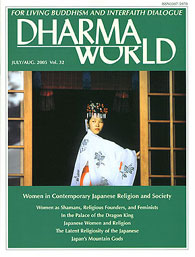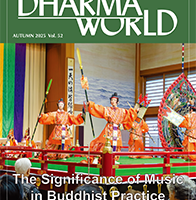Women in Contemporary Japanese Religion and Society
Women as Shamans, Religious Founders, and Feminists by Susumu Shimazono
Susumu Shimazono is a professor in the Department of Religious Studies of the University of Tokyo. His special fields are the comparative study of religious movements and the history of religion in modern Japan. He has also taught as a guest professor at universities in the United States, France, and Germany. His recent publications include “Iyasu chi” no keifu (The Genealogy of “Healing Wisdom”) and Posutomodan no shin shukyo (Postmodern New Religions).
In the Palace of the Dragon King by Christal Whelan
The exception to the rule of institutional exclusion of women in Japanese religion seems to be the new religious movements, this scholar says, where some women managed to actualize their visions of a more inclusive world.
Christal Whelan is currently an Earhart Fellow at the Institute on Culture, Religion, and World Affairs at Boston University, where she is also completing a Ph.D. in cultural anthropology. She was a Fulbright Fellow to Japan from 2003 to 2005 while affiliated with the International Research Center for Japanese Studies, in Kyoto. In 2000 she trained at Mount Koya’s Niso Gakuin, where she was ordained in the Shingon tradition. She has published numerous articles and a book in the field of Japanese religion and culture.
Japanese Women and Religion by Fumiko Nomura
A teacher at a women’s university believes that the simplicity of her young students–a quality that goes beyond unaffectedness or earnestness–is what should truly be called “spiritual.”
Fumiko Nomura, a professor at Kawamura Gakuen Women’s University, specializes in American religious history. She is also on the board of directors of the International Institute for the Study of Religions, and has translated Jerald C. Brauer’s Protestantism in America: A Narrative History into Japanese.
The Latent Religiosity of the Japanese by Emiko Namihira
There are many who have awakened to the fact that people cannot be fulfilled through living for themselves alone but are fulfilled by helping other beings.
Emiko Namihira, Ph.D., is professor of cultural anthropology and gender studies at Ochanomizu University in Tokyo. Her special field is medical anthropology and the anthropology of religion. She is the author of a number of books and articles, including Karada no bunka jinruigaku (Cultural Anthropology of the Body), Nihonjin no shi no katachi (The Japanese Form of Death), and Iryo jinruigaku nyumon (Introduction to Medical Anthropology).
Japan’s Mountain Gods by Jun’ichiro Ishikawa
The Japanese have dwelled in fields and mountains since ancient times. Because the fields and mountains provide the necessities of daily life, people have long worshiped mountain gods as the local guardian deities.
Jun’ichiro Ishikawa, professor emeritus of Tokoha Gakuen Junior College, in Shizuoka Prefecture, serves on the boards of directors of Shizuoka Prefecture’s Folklore Society and Society for Conservation of Cultural Properties. He is the author of Kappa no sekai (The World of Kappa [Water Sprites]) and other works, and coauthor of Nihon shukyo no fukugo-teki kozo (The Composite Structure of Japanese Religion).
Niwano Peace Prize
Toward a Global Ethic by Hans Kung
The 22nd Niwano Peace Prize was awarded to the Roman Catholic theologian Dr. Hans Kung, president of the Global Ethic Foundation in Germany and Switzerland. Together with his contributions to interfaith dialogue and cooperation, Dr. Kung’s advocacy of a “Global Ethic” as a way of realizing world peace has won him recognition around the world. The prize was presented in Tokyo on May 11.
Reflections
Living by the Precepts by Nichiko Niwano
Buddhists have the Six Perfections and observance of the five precepts as the standards of daily life. We are taught to live by the Buddha’s precepts. Why is keeping those precepts important?
Nichiko Niwano is president of Rissho Kosei-kai and the Niwano Peace Foundation, a president of the World Conference of Religions for Peace (WCRP), and chairman of Shinshuren (Federation of New Religious Organizations of Japan). This article is a translation of a recent interview with Rev. Niwano that originally appeared in Rissho Kosei-kai’s Japanese periodical Yakushin.
The Tranquil Realm of Nirvana by Nikkyo Niwano
This essay is part of a continuing series of translations from a volume of inspirational writings by the late founder of Rissho Kosei-kai. DHARMA WORLD will continue to publish these essays because of their lasting value as guidance for the daily practice of one’s faith.
Nikkyo Niwano, the late founder of Rissho Kosei-kai, was an honorary president of the World Conference of Religions for Peace and was honorary chairman of Shinshuren (Federation of New Religious Organizations of Japan) at the time of his death in October 1999.
The Stories of the Lotus Sutra
The Bodhisattva Never Disrespectful by Gene Reeves
It is significant that this bodhisattva tells everyone he meets, including those who are arrogant, angry, disrespectful, and mean-spirited, that they are bodhisattvas.
Gene Reeves is currently studying, teaching, and writing on Buddhism in Tokyo. A consultant and teacher at Rissho Kosei-kai, he was recently a research fellow at Rikkyo University. Before coming to Japan in 1989, Dr. Reeves was the dean of Meadville/Lombard Theological School and professorial lecturer in the Divinity School of the University of Chicago.
Conference Report
The 19th IAHR World Congress Discusses the Role of Religion in Issues of Conflict and Peace by Gaynor Sekimori
Gaynor Sekimori, a specialist in the history of Japanese religion, is a long-term practitioner of Shugendo at Mount Haguro. She received her Ph.D. from the University of Cambridge with a study of Haguro Shugendo and is presently an associate professor in the Institute of Oriental Culture at the University of Tokyo, where she also acts as the managing editor of the International Journal of Asian Studies (Cambridge University Press).
Essay
A Leadership of Openness and Interreligious Dialogue: A Visit with His Holiness Pope John Paul II by Ignacy-Marek Kaminski
In the author’s student days in Krakow, Poland, the young Cardinal Karol Wojtyla, the future Pope John Paul II, served as a spiritual counselor. Professor Kaminski, now a permanent resident of Japan, met the ailing pope in his Vatican apartment in January, with his two Eurasian children. He believes that the late pope’s legacy of open leadership and interreligious dialogue will long live in people’s hearts.
Ignacy-Marek Kaminski is a visiting professor of ethnology and cultural anthropology at Warsaw University. Dr. Kaminski, now a Swedish citizen, has also been a member of the Swedish Writers Union since 1984: his works are published in nine languages. His latest work is “Applied Anthropology and Diplomacy,” in The Psychology of Diplomacy, Harvey J. Langholtz & Chris E. Stout, eds. (Westport, CT: Praeger, 2004).
Gotama Buddha (73)
The Beginnings of Deification (1) by Hajime Nakamura
In outward form, Sakyamuni was no different from other bhikkus. Later depictions of him with beautiful hair and a halo, surrounded by disciples, were errors in terms of historical truth.
The late Dr. Hajime Nakamura, an authority on Indian philosophy, was president of the Eastern Institute in Tokyo and a professor emeritus of the University of Tokyo at the time of his death in October 1999. This ongoing series is a translation of Gotama Buddha, vol. 2 (Tokyo: Shunjusha, 1992).
The Threefold Lotus Sutra: A Modern Commentary (83)
The Sutra of the Lotus Flower of the Wonderful Law
Chapter 10: A Teacher of the Law (2) by Nikkyo Niwano
This is the eighty-third installment of a detailed commentary on the Threefold Lotus Sutra by the late founder of Rissho Kosei-kai, Rev. Nikkyo Niwano.























































































